Richard III Blu-ray Movie
HomeRichard III Blu-ray Movie 
Limited Edition to 3000 - SOLD OUTTwilight Time | 1995 | 104 min | Rated R | Apr 14, 2015
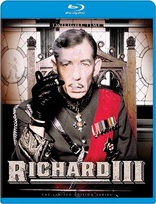
Movie rating
7.5 | / 10 |
Blu-ray rating
| Users | 0.0 | |
| Reviewer | 4.0 | |
| Overall | 4.0 |
Overview
Richard III (1995)
Shakespeare's immortal tale of ambition, lust and murderous treachery is brilliantly updated and brought to life in this riveting, 20th-Century masterpiece. In 1930's Britain, a savage civil war between two royal families has just concluded. But even as the newly installed King Edward (John Wood) takes the reins of power, his ruthless, younger brother Richard (Ian McKellen) sets in motion a monstrous scheme to claim the crown for himself. Enlisting the aid of equally duplicitous allies in the court, Richard embarks on a merciless, single-minded campaign of betrayal, seduction and cold-blooded murder to achieve the goal that has obsessed him all of his tortured life: to be king... at any price.
Starring: Ian McKellen, Annette Bening, Jim Broadbent, Robert Downey Jr., Maggie SmithDirector: Richard Loncraine
| War | Insignificant |
| Drama | Insignificant |
Specifications
Video
Video codec: MPEG-4 AVC
Video resolution: 1080p
Aspect ratio: 2.40:1
Original aspect ratio: 2.39:1
Audio
English: DTS-HD Master Audio 5.1 (48kHz, 24-bit)
Music: DTS-HD Master Audio 2.0
Subtitles
English SDH
Discs
50GB Blu-ray Disc
Single disc (1 BD)
Playback
Region A (B, C untested)
Review
Rating summary
| Movie | 4.0 | |
| Video | 4.0 | |
| Audio | 4.0 | |
| Extras | 1.5 | |
| Overall | 4.0 |
Richard III Blu-ray Movie Review
The King's Speeches.
Reviewed by Jeffrey Kauffman May 2, 2015Has Richard III been getting a bum rap all these years? The Richard III Society (and, yes, there is such a thing) thinks so, and declares why in its mission statement:
In the belief that many features of the traditional accounts of the character and career of Richard III are neither supported by sufficient evidence nor reasonably tenable, the Society aims to promote in every possible way research into the life and times of Richard III, and to secure a reassessment of the material relating to this period, and of the role in English history of this monarch.This might seem to be a fool’s errand, with Don (and Dona) Quixotes tilting at monolithic windmills and attempting to swim upstream against the tide of established history, and chief amongst the obstacles is William Shakespeare’s iconic telling of the monarch’s tale, a version of the story which has become so ensconced in people’s minds as to have become history in a very real, if perhaps inaccurate, way. Richard III’s tumultuous rise to power and then relatively brief reign makes him one of the more compelling anti-heroes in Shakespeare’s canon, and his inherent penchant towards scheming means he’s no mere dupe like, for example, that unfortunate Macbeth. The “real” Richard III may not have been the calculating villain he’s portrayed as in Shakespeare’s play, but even for the many for whom the Shakespeare version is definitive may be at least temporarily befuddled by this 1995 film, one which perhaps shockingly recasts British royalty (or at least some British royalty) as Fascists in something akin to the 1930s. It’s a shocking temporal and even ambient displacement of Shakespeare’s work, and while it’s provocative quite a bit of the time, purists may find it equally problematic.

Richard III presents any number of problems for adapters, not the least of which is its ungainly length (one of the longest plays in Shakespeare’s oeuvre). Typically even stage productions of the play lop off huge amounts of content, even going so far as to eliminate characters outright, something that is evident in both this version as well as the 1955 version which starred Laurence Olivier. This film’s Richard III, Ian McKellen, was integrally involved in the adaptation, and there’s a fascinating study guide that McKellen helped to prepare for students when the film first appeared. There are some salient pieces of information in the guide which may help to elucidate what some may feel is an intentionally outré approach toward this iconic material:
Anyone who adapts a literary text into a film obviously faces challenges. . .One thing that we need to bear in mind is that the plays were originally intended as scripts for actors and not as texts for readers. Unlike a poem, which is normally written for close reading, a play text is not written for the same purpose. It always assumes that part of the impact will come from what happens on the stage itself. . .In the nineteenth and twentieth centuries theatre directors have usually adopted an approach to staging the plays which did not exist in Shakespeare's time. . .In Shakespeare's time, the flow of the play was far more like the flow of a film - as one set of actors left the stage another would appear. Like the film, which has no pauses between scenes, the audience of Shakespeare's time would not have expected any pauses in the action.That at least may indicate the reasons behind the cinematic sweep of this version, though the whole scale change of time period and emphasis on the sociopolitical climate of the 1930s may still strike some as off putting, if admittedly applicable to Richard III’s quest for absolute power.
That said, one of the most interesting tidbits in the study guide is this little nugget:
When Shakespeare came to write 'King Richard III', the events on which he based his play had happened only one hundred years previously. However, in telling the story of Richard, Shakespeare was not interested in retelling history. He was a dramatist, not an historian. . .In many ways, Shakespeare's approach to the subject of his play is similar to that of filmmaker Oliver Stone, in his films JFK and Nixon. In both of these films, are we watching a documentary, or are we watching one person's view of an historical event, dramatised in order to engage an audience in a gripping story?Perhaps given the fact that The Bard himself wasn’t above painting Richard III’s story with his own fanciful brush, it becomes easier to understand the decidedly audacious approach the original McKellen stage version and, later, its film iteration employed. McKellen and film director Richard Loncraine obviously wanted something visceral, including visually, to “grab” the viewer, and that’s undeniably the case with this often riveting Richard III. Aside from the rebooted historical milieu, the film is quite notable for how it skews London landmarks in an unusual way. St. Pancras Station, for example, the huge rococo cathedral of a train terminal (where international travelers gather to catch the Chunnel Train to Paris), is an incredibly impressive edifice in a not so nice section of London. Here, in Richard III, it becomes something akin to the Royal Palace. Some of these fabrications are probably “inside jokes” to those more familiar with British history and landmarks than some of us typically clueless Americans, but they indicate just how radically McKellen and company have reinvented just about everything in this Richard III.
This is a brisker presentation than Olivier’s, and not merely due to the modernization aspects. Characters have been omitted (and/or combined), and there’s also been a somewhat cheeky approach toward Shakespeare’s text (interpolated lines abound, as well as lines that in the “new, improved” historical context take on different meanings). Performances are pitch perfect throughout, with McKellen less of a misshapen hangdog than Olivier, but probably more ruthless seeming, nonetheless. A huge supporting cast includes great turns by a variety of eclectic performers, including Robert Downey, Jr., Maggie Smith, Jim Broadbent and Annette Bening. Maggie Smith's Downton Abbey cohort Jim Carter is also featured in a strong supporting performance.
Richard III Blu-ray Movie, Video Quality 
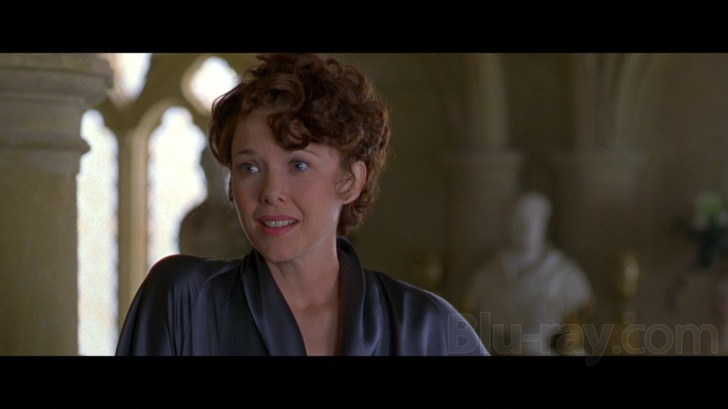
Richard III is presented on Blu-ray with an AVC encoded 1080p transfer in 2.40:1. Elements are in generally excellent condition, and while colors aren't brilliantly vivid, they're quite appealing, with reds popping especially well. Grain is quite heavy throughout this presentation, and occasionally resolves a bit unnaturally (look at some of the darker screencaptures accompanying this review). Director Richard Loncraine and cinematographer Peter Biziou favor shooting into light or dealing with misty environments, two approaches which tend to give the imagery a gauzy, slightly impressionistic, look some of the time. Still, clarity is commendable, and close-ups offer nice amounts of fine detail on the Academy Award nominated costumes and sets.
Richard III Blu-ray Movie, Audio Quality 
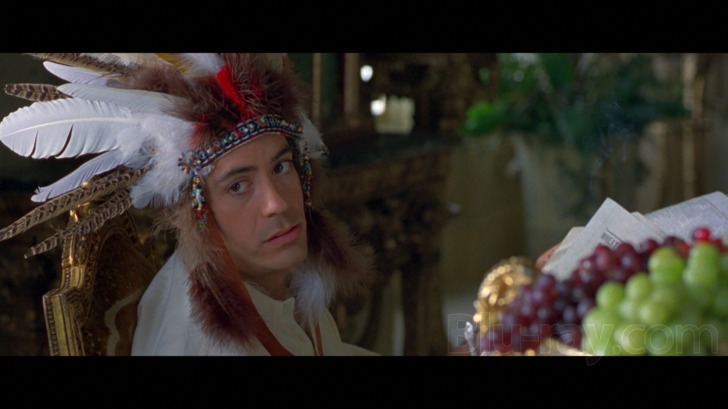
Richard III's lossless DTS-HD Master Audio 5.1 mix is actually a fairly immersive, and at times perhaps surprisingly bombastic, experience, at least given the general impression that a Shakespeare adaptation is going to be nothing but a yak-fest. The surrounds are regularly used for a variety of impressive effects, something which the semi-modern milieu offers opportunities to exploit. Dialogue is still very cleanly presented and is always very well prioritized. Trevor Jones' enjoyable score is also nicely dispersed throughout the surrounds and offers excellent support in several key sequences. Fidelity is excellent and dynamic range extremely wide for "this" kind of film.
Richard III Blu-ray Movie, Special Features and Extras 
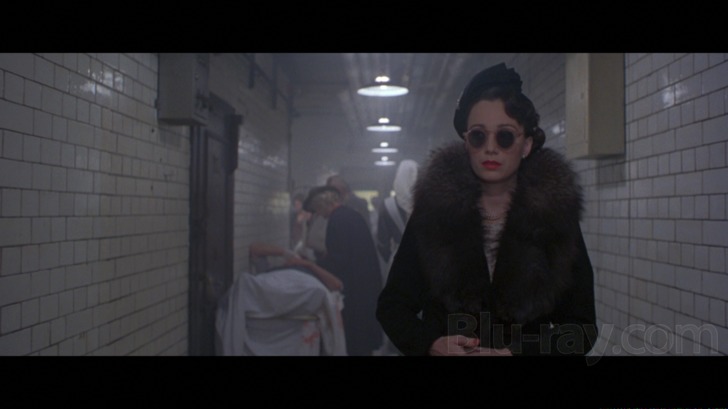
- Original Theatrical Trailer (1080p; 2:48)
- MGM 90th Anniversary Trailer (1080p; 2:06)
- Isolated Music and Effects Track is presented in DTS-HD Master Audio 2.0.
Richard III Blu-ray Movie, Overall Score and Recommendation 
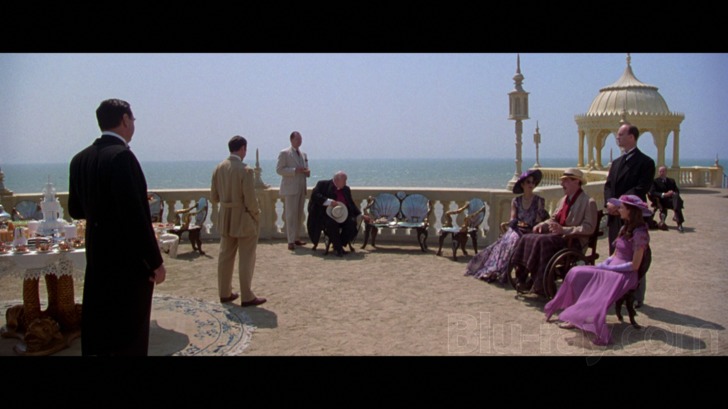
This Richard III is pretty cheekily audacious quite a bit of the time, but it's also surprisingly apt and effective. Buoyed by a chilling and menacing lead performance by Ian McKellen, the film moves at a relative breakneck pace (at least for a Shakespeare history) and creates an unexpected amount of emotional heft by the sad, inexorable conclusion. Anyone wanting a Masters' level thesis on adaptive techniques would be well advised to watch this in a double feature with the Olivier version. Neither may be actual "history," but each offers superb pleasures, albeit in completely different ways. Technical merits are generally strong, and Richard III comes Recommended.
Similar titles
Similar titles you might also like

The Life and Death of Colonel Blimp
1943

Things to Come
1936

Sophie Scholl: The Final Days
Sophie Scholl: Die letzten Tage | 4K Restoration
2005

Sherlock Holmes
1922

The Entertainer
1960

A Hidden Life
2019

Loveless
Нелюбовь / Nelyubov
2017

Aquarius
2016

Henry V
1944

The Great Dictator
1940

Kagemusha
影武者
1980

High Hopes
1988

Merry Christmas Mr. Lawrence
1983

Private Vices, Public Virtues
Vizi privati, pubbliche virtù
1976

Tower of London
1939

Amen.
Der Stellvertreter
2002

Come and See
Иди и смотри / Idi i smotri
1985

Ivan's Childhood
Ива́ново де́тство / Ivanovo detstvo
1962

The Bridge
Die Brücke
1959

Fires on the Plain
野火 / Nobi
1959
